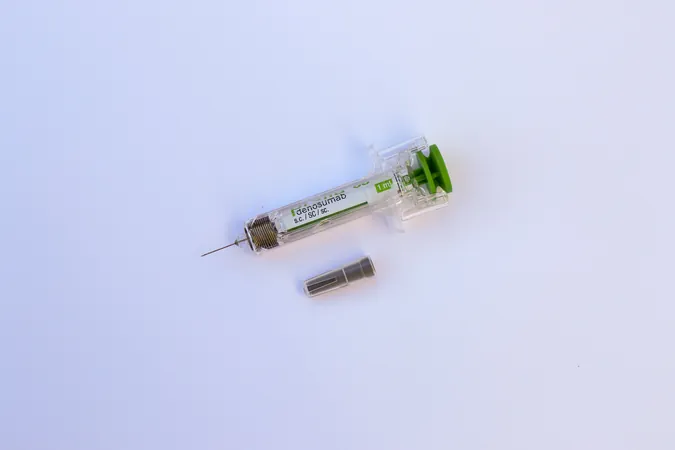
New Clinical Trial Explores Osteoporosis Drug as a Game-Changer for Type 1 Diabetes
2025-04-04
Author: Arjun
Introduction
In a groundbreaking development for diabetes research, the City of Hope Medical Center has commenced a phase 1/2 clinical trial aimed at examining whether the osteoporosis treatment denosumab can enhance beta cell health in individuals diagnosed with early-stage type 1 diabetes.
About Denosumab
Originally developed by Amgen, denosumab is known under the brand name Prolia for osteoporosis treatment and Xgeva for bone tumors. Recently, the FDA has also approved four biosimilars of this medication, with the latest being Fresenius’s Conexxence/Bomyntra, alongside others like Celltrion's Stoboclo/Osenvelt, Samsung’s Ospomyv/Xbryk, and Sandoz's Jubbonti/Wyost.
Type 1 Diabetes Overview
According to the Centers for Disease Control and Prevention (CDC), around 2 million Americans suffer from type 1 diabetes, which accounts for approximately 5% to 10% of all diabetes cases. This autoimmune disorder triggers the immune system’s T cells to attack and destroy insulin-producing beta cells, making insulin replacement therapy the standard treatment for affected patients.
The Clinical Trial
The innovative study at City of Hope, which is now welcoming participants, seeks to determine whether denosumab can not only protect but also regenerate the beta cells responsible for insulin production. Remarkably, in the earlier stages of type 1 diabetes, some of these beta cells retain functionality, providing a potential target for therapy.
If proven effective, denosumab might shield remaining beta cells from the autoimmune onslaught, leveraging a mechanism that halts bone degradation to possibly prevent the destruction of islet cells as well. Lead researcher Dr. Rupangi Vasavada notes that their previous work has indicated that the RANKL/RANK pathway, which denosumab inhibits for bone health, is also implicated in beta cell death.
"This suggests that we can utilize denosumab not just to safeguard bones but also to enhance pancreatic beta cell health, potentially delaying the progression of type 1 diabetes and improving glycemic control," Dr. Vasavada explained.
Trial Details
Currently, City of Hope is actively enrolling participants for the trial, directed by Dr. Fouad R. Kandeel, who alongside Dr. Vasavada is keen to evaluate the safety and efficacy of denosumab in this new context. The funding for the clinical trial is primarily provided by Breakthrough T1D, a leading organization focused on type 1 diabetes research and advocacy.
The trial involves a multicenter approach and will assess the safety and effectiveness of denosumab in enhancing beta cell function and glucose control in patients who still produce some insulin. Participants will be randomly assigned in a 2:1 ratio, with 30 individuals receiving a subcutaneous injection of 60 milligrams of denosumab every three months— totaling four injections—while 15 others will receive a saline placebo. Researchers will monitor participants over a period of 12 months to track any adverse effects and measure changes in beta cell functionality and blood sugar levels.
Collaborating Institutions
In an exciting addition to this research initiative, two other clinical centers— the University of Alabama at Birmingham and Indiana University—will also partake in this important study, amplifying the reach and impact of the trial.
Conclusion
As scientists continue to hunt for innovative solutions to combat type 1 diabetes, this trial stands at the forefront of potential breakthroughs that may redefine treatment strategies for millions affected by this challenging condition. Stay tuned as we bring you updates on this promising research!


 Brasil (PT)
Brasil (PT)
 Canada (EN)
Canada (EN)
 Chile (ES)
Chile (ES)
 Česko (CS)
Česko (CS)
 대한민국 (KO)
대한민국 (KO)
 España (ES)
España (ES)
 France (FR)
France (FR)
 Hong Kong (EN)
Hong Kong (EN)
 Italia (IT)
Italia (IT)
 日本 (JA)
日本 (JA)
 Magyarország (HU)
Magyarország (HU)
 Norge (NO)
Norge (NO)
 Polska (PL)
Polska (PL)
 Schweiz (DE)
Schweiz (DE)
 Singapore (EN)
Singapore (EN)
 Sverige (SV)
Sverige (SV)
 Suomi (FI)
Suomi (FI)
 Türkiye (TR)
Türkiye (TR)
 الإمارات العربية المتحدة (AR)
الإمارات العربية المتحدة (AR)